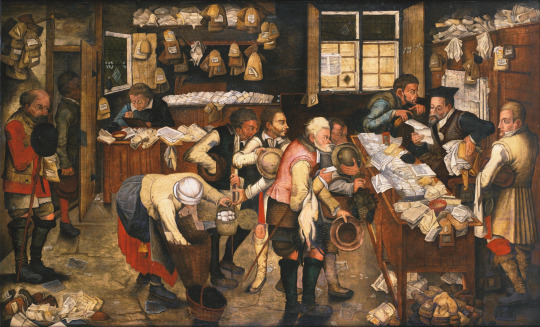#a notary painted this
Text
I've been so busy the past few weeks between moving and working and cleaning and everything. I've barely had time to paint, let alone post anything relatively interesting. But check out my graffiti wall. I'm soooo close to being done!!










#art#acrylic painting#columbus ohio#a notary painted this#notary tree#painting#basement#wall art#graffitiart#graffiti#i hate moving#always watching#love#music#graffiti tags#swerve#chance#rouge#dank#cash#peace#eyes#abstract eyes
3 notes
·
View notes
Text

Pieter Brueghel the Younger created original works largely in the idiom of his father which are energetic, bold and bright and adapted to the 17th-century style. One of the artist's most successful original designs was the painting of The Village Lawyer (sometimes also called the Tax Collector's Office, the Payment of the Tithe, the Lawyer of Bad Cases and the Notary's Office). The different titles of the work indicate that it may have been interpreted in these different ways in the 17th century. The title The Village Lawyer is probably the best suited since the person behind the desk is wearing a lawyer's bonnet, the collection of taxes usually did not occur in such setting and the paperwork and bags on the desk look like those for requests and decrees. The picture also shows peasants lining up with presents such as chickens and eggs to please the lawyer, which was a common occurrence, whereas tithe payments were made in grain. The painting shows his interest in and close observation of village life. Pieter Brueghel the Younger's workshop made many copies of the composition in different formats. There exist 19 signed and dated versions of this work (from between 1615–22) out of some 25 originals and 35 questionable versions.
#Pieter Brueghel#pieter brueghel the younger#art#painting#classic art#old paintings#the village lawyer#law office#17th century#notary's office#Brueghel#paintings
2 notes
·
View notes
Text
Top Commercial Lawyers in Mississauga

#lawyers#lawyer#real estate lawyer#ontario#mississauga#business lawyers#businesslawyer#brampton#canada#notary public mississauga#commercial lawyers#commercial property investment#commercial real estate#commercial painting#commercial cleaning#commercial roofing#business#founder#sales#industry#startup
0 notes
Text
In 1678, a Chaldean priest from Baghdad reached the Imperial Villa of Potosí, the world’s richest silver-mining camp and at the time the world’s highest city at more than 4,000 metres (13,100 feet) above sea level. A regional capital in the heart of the Bolivian Andes, Potosí remains – more than three and a half centuries later – a mining city today. [...] The great red Cerro Rico or ‘Rich Hill’ towered over the city of Potosí. It had been mined since 1545 [...]. When Don Elias arrived [...], the great boom of 1575-1635 – when Potosí alone produced nearly half the world’s silver – was over, but the mines were still yielding the precious metal. [...]
On Potosí’s main market plaza, indigenous and African women served up maize beer, hot soup and yerba mate. Shops displayed the world’s finest silk and linen fabrics, Chinese porcelain, Venetian glassware, Russian leather goods, Japanese lacquerware, Flemish paintings and bestselling books in a dozen languages. [...]
Pious or otherwise, wealthy women clicked Potosí’s cobbled streets in silver-heeled platform shoes, their gold earrings, chokers and bracelets studded with Indian diamonds and Burmese rubies. Colombian emeralds and Caribbean pearls were almost too common. Peninsular Spanish ‘foodies’ could savour imported almonds, capers, olives, arborio rice, saffron, and sweet and dry Castilian wines. Black pepper arrived from Sumatra and southwest India, cinnamon from Sri Lanka, cloves from Maluku and nutmeg from the Banda Islands. Jamaica provided allspice. Overloaded galleons spent months transporting these luxuries across the Pacific, Indian and Atlantic oceans. Plodding mule and llama trains carried them up to the lofty Imperial Villa.
---
Potosi supplied the world with silver, the lifeblood of trade and sinews of war [...]. In turn, the city consumed the world’s top commodities and manufactures. [...] The city’s dozen-plus notaries worked non-stop inventorying silver bars and sacks of pesos [...]. Mule trains returning from the Pacific brought merchandise and mercury, the essential ingredient for silver refining. [...] From Buenos Aires came slavers with captive Africans from Congo and Angola, transshipped via Rio de Janeiro. Many of the enslaved were children branded with marks mirroring those, including the royal crown, inscribed on silver bars.
Soon after its 1545 discovery, Potosí gained world renown [...]. Mexico’s many mining camps [...] peaked only after 1690. [...] Even in the Andes of South America there were other silver cities [...]. But no silver deposit in the world matched the Cerro Rico, and no other mining-refining conglomeration grew so large. Potosí was unique: a mining metropolis.
Thus Don Elias, like others, made the pilgrimage to the silver mountain. It was a divine prodigy, a hierophany. In 1580, Ottoman artists depicted Potosí as a slice of earthly paradise, the Cerro Rico lush and green, the city surrounded by crenellated walls. Potosí, as Don Quixote proclaimed, was the stuff of dreams. Another alms seeker, in 1600, declared the Cerro Rico the Eighth Wonder of the World. A [...] visitor in 1615 gushed: ‘Thanks to its mines, Castile is Castile, Rome is Rome, the pope is the pope, and the king is monarch of the world.’ [...]
---
For all its glory, Potosí was also the stuff of nightmares [...].
Almost a century before Don Elias visited Potosí, Viceroy Francisco de Toledo revolutionised world silver production. Toledo was a hard-driving bureaucrat of the Spanish empire [...]. Toledo reached Potosí in 1572, anxious to flip it into the empire’s motor of commerce and war. By 1575, the viceroy had organised a sweeping labour draft, launched a ‘high-tech’ mill-building campaign, and overseen construction of a web of dams and canals to supply the Imperial Villa with year-round hydraulic power, all in the high Andes at the nadir of the Little Ice Age. Toledo also oversaw construction of the Potosí mint, staffed full-time with enslaved Africans. [...] Toledo’s successes came with a steep price. Thanks to the viceroy’s ‘reforms’, hundreds of thousands of Andeans became virtual refugees (those who survived) and, in the search for timber and fuel, colonists denuded hundreds of miles of fragile, high-altitude land. [...] The city’s smelteries belched lead and zinc-rich smoke [...].
The Habsburg kings of Spain cared little about Potosí’s social and environmental horrors. [...] For more than a century, the Cerro Rico fuelled the world’s first global military-industrial complex, granting Spain the means to prosecute decades-long wars on a dozen fronts – on land and at sea. No one else could do all this and still afford to lose. [...]
By [...] 1909 [...], mineral rushes had helped to produce cities such as San Francisco and Johannesburg, but nothing quite compared for sheer audacity with the Imperial Villa of Potosí, a neo-medieval mining metropolis perched in the Andes of South America.
---
Text by: Kris Lane. “Potosi: the mountain of silver that was the first global city.” Aeon. 30 July 2019. [Bold emphasis and some paragraph breaks/contractions added by me.]
80 notes
·
View notes
Text
What if. The "Canzone" of Giacomo da Lentini but it’s Vernetto. Inspired by that one Vernetto fic headcanon (Sin of Love? I think?) that Sonetto was born in Lentini, the birthplace of Giacomo da Lentini, the guy credited with the creation of sonnets.
English translation of the “Canzone” below. Whoooo boy tumblr formatting made this longer than it had to be so I put it under a break
Wonderfully
a love binds
and possesses me at every hour,
Like one who keeps a model in his mind
and depicts
a similar likeness,
so, beautiful lady, do I,
because, inside my heart
I carry your image.
I seem to carry in my heart,
your painted likeness,
which is not apparent from outside.
O God, how hard it seems!
I don't know if you know
with what true heart I love you,
for I am so timid
that I watch you in secret
and do not show my love.
Having great desire
I painted a painting,
beautiful lady, of your likeness,
and when I don't see you,
I look upon that image,
and it seems you are before me,
like someone who believes
himself saved through faith,
when he cannot see the way.
In my heart a pain is burning,
like to one who keeps a fire
hidden in his breast.
The more he tries to stifle it,
it burns more widely
and cannot be contained.
Likewise I burn
when I pass and do not look
at you, lovely visage.
If do I pass and look at you
and do not turn around
to look at you again,
beautiful lady,
at every step
I cast a sigh
and am filled so much anguish
that I surely recognize
that I hardly know myself,
so beautiful do you appear to me.
I have praised you so greatly,
my Lady, everywhere
for the beauties you possess.
I don't know if you've been told
that I do it just for art's sake,
and that this pains you.
But you may know through signs
what I would say with my tongue,
when you see how I appear.
O fresh and new little song,
go and sing something new.
Rise up early in the morning
before the most beautiful -
the flower of all the lovelies --
blonder than fine gold:
«Give your love, that is so precious,
to the notary
who was born in Lentini.»
14 notes
·
View notes
Text
La Cucina Italiana awarded their Best Pasta Sauce prize to one chef’s Sugo Marinetti, or Marinetti sauce. Said sauce stood out not only for its unique combination of chopped pistachios and artichokes sauteed in butter, but also for its ironic title: the firebrand poet Filippo Marinetti, for whom the pasta sauce was named, was at that very moment fighting to banish pasta from Italy.
La Cucina Italiana, a magazine founded by wealthy, fascist editor Umberto Notari and his wife Delia Pavoni Notari, had helped launch Marinetti’s war on pasta just over a year earlier. In their December 1930 issue, Marinetti published the Manifesto of Futurist Cooking, where he declared pasta to be “an absurd Italian gastronomic religion” and called for its abolition.
The essay was one of many fascist-leaning Futurist manifestos published in the early 20th century that called for the destruction of the old in favor of the new in fields such as poetry, painting, and cinema. Along with his proponents, Marinetti, who founded the Futurist movement in 1909, blamed tradition for Italy’s declining world stature. Futurists embraced technology, war, and masculinity, while decrying museums, libraries, and many other long-held Italian treasures—pasta among them.
80 notes
·
View notes
Note
Second chapter of Gift is posted! Also, do you know what Desmond would be called in that time? Would it be Desmond Auditore Da Firenze, even though they're not in Florence and Desmond has never even been there, or Da Monteriggioni, or da Roma? Or do you know any sources I could look at regarding the naming conventions?
No sources, I'm sorry, I mostly learned by osmosis. It's basically just pointing out where a person is from, and since Desmond wasn't born or is likely to be raised in Florence, "da Firenze" isn't it.
I think Ezio would go with whatever place Desmond is initially raised in - Monteriggioni if that's where they stay, etc. Desmond Auditore da Roma would raise questions in that situation. If, however, Monteriggioni gets razed to the ground by the Papal armies again and Ezio heads to Rome, being from Monteriggioni might paint a target on Desmond's back.
Tho since Ezio claims Desmond officially as part of the Auditore family, it might not be that important to point out where he's from, precisely. Few of the other characters in Ezio trilogy make the point to do it, Mario never does and Leonardo is a "da Vinci" because as a bastard he doesn't have a family name and "son of Ser Piero from Vinci" is a mouthful. (Personally I think the reason it's such a commonly pointed out thing with Ezio is because his family was part of the upper echelon, his father was a notary, and it's remembrance for what he lost... and his enemies use it to mock him, maybe. "Ezio Auditore from Florence... except you're not welcome in Florence anymore, are you?")
60 notes
·
View notes
Text

'Portrait of Jacques Wittewronghele' as painted in 1574 by Cornelis Visscher the Elder. Wittewronghele (1531-1593) was a London notary, which is to say that he was the legal official who officiated over the authentication of signatures, one of the oldest recognised roles for lawyers which extends into different areas of law including probates and wills, and the sale and purchase of property. Please left click here for a multi-lingual history of the role of notary. Please left click here to read more about Wittewronghele.
6 notes
·
View notes
Text
Finally, the finished look.

#wallart#acrylic painting#columbus ohio#a notary painted this#art#notary tree#painting#basement#notary#acrylic#you like it#mural#finished#finally done#ocean waves#sunset#palm trees
2 notes
·
View notes
Text
Beyond Fabrics of Time and Space
i got my heart ripped out and stomped on by two lovers who died too soon.. i want to bless you with my pain and suffering. <3
[summary] In the midst of uniting the three realms a war broke out. You and Diavolo get married minutes before the both of you pass away.
[one shot] [Diavolo x gn!reader]

It’s cold–freezing. Everything is freezing, and dark, and aching. And there are voices coming from all around, angry ones, scared ones but they are muffled. Ears ringing, you can only focus on the hands, big hands, holding you and pulling you slowly towards something warm. It’s only then, when the memories rush in, your eyes open wide.
There was an attack that proceeded from a revolt. It had not only attacked the Devildom, but simultaneously attacked the Celestial Realm. From there, everything went down to shit; like an avalanche rapidly growing and causing chaos. Now, in the midst of uniting the three realms, a war broke out and it left you with the hellborn city you loved so much in ruins. And its Prince holding you for dear life as poison visibly courses through his veins.
“... Love, I am so sorry.” He croaks. His voice cracks, wobbly as the tears threaten to spill. They do, eventually, they fall on your cheeks as he hovers over you, looking down. Eventually, his tears mix in with your own and fall to the floor of a poorly built wooden shack residing in the outskirts of the city.
It’s not far from the city of course, so you can still hear the shouts and screams and the explosions. But the Prince’s voice grabs your attention and your heart and makes it twist and ache. “I am sorry…” He sobs hard, holding you closer to him. He’s starting to grow cold.
“What are you sorry for?” You whisper. You would be surprised if your voice could go any higher than a whisper. You could barely make note of what your body was doing, it felt limp. It probably was, giving up from applying pressure to the spot where the attackers forced and ripped a dagger into you. “You did nothing wrong.”
“I did everything wrong.” He argues, his voice hoarse from the sobbing. He places a hand on your cheek and instinctively, you lean into it. He wipes your tears with his thumb, trying to even his breathing as he does. You look straight at the golden eyes you fell in love with all these years. “I-I failed to protect everyone, my home, my people. I could not even save you from all this malice and destruction. My love, my heart, I failed you.”
“Dia.” You draw his attention. His eyes are starting to dullen. “You did not fail me. I am still here with you, am I not, my Prince?” He nods, lightly squeezing the hand holding your face. “I would rather die like this than any other way.”
Diavolo raises you all while lowering himself to kiss you. His kisses do not stop at your lips. They range from lips to your cheeks to your temples. Anywhere he can reach, anywhere he can feel you. In between the shower of kisses are his words spoken ever so softly. I love you, I love you, I love you. I am sorry. Forgive me.
Time seems to pass by so slowly, but you are grateful for it. You focus on him and him only. Despite the pain reaching your brain, begging for you to move and to find something so you can grasp on to life a little longer. Despite the pact marks painting your body and telling you to hold on a little longer and you’ll be fine.
It’s just you and him waiting for death to arrive.
“Dia, before we go–” You wince, gulping your spit to speak a little more clearly. He starts to cough, looking away. You can make out that what he’s coughing out is blood. It’s dark at night and so thick it barely drips down his hand when opens his palm. He turns to you, breathing heavy, looking for you to continue. “I wish to die not as a lover but as a s-spouse.” You stress.
“Are you proposing to me?” Diavolo asks. A small chuckle followed by a wince leaves him. His eyes do not look away from you.
“No.” Yes. You say. “We d-do not have a witness nor a notary. I’m devoting the r-rest of my life to you, is all.”
“I wish I could give you a proper wedding.” He says. Diavolo pulls you in closer, squeezing you into his frame even tighter. “I would have been your husband for millenniums rather than a few seconds.” And it hurts. It hurts to hear the truth of your reality. In a minute or two the both of you will be dead. In just a couple hundred seconds, the both of you would be lifeless on the floor with a wishful marriage in vain.
“It doesn’t matter.” You say, using the last of your strength to take his hand in yours and squeeze it. I love you. “Because I, no matter if it’s for a few seconds or for the rest of eternity, take you Diavolo to be my husband. Beyond the fabrics of time and space, you will forever be my husband.”
Everything is freezing, and dark, and aching. And you are sure that there is no chance of living again. But you blackout with a smile on your face, hearing him speak back to you.
“Beyond the fabrics of time and space, not even death can part us. I will always be with you, my love. From before we pass, until after we meet in the next life. All the way till it ceases to exist. I love you. ”
tags: @obeythebutler @beels-burger-babe @minteyeddevil
#obey me shall we date#obey me! shall we date?#obey me diavolo x reader#obey me diavolo#character death#major character death#lovers#last minute proposal#i’m still heartbroken
192 notes
·
View notes
Text
SAINT OF THE DAY (October 18)

On October 18, Catholics and other Christians around the world will celebrate the feast of St. Luke, the physician and companion of St. Paul whose gospel preserved the most extensive biography of Jesus Christ.
St. Luke wrote a greater volume of the New Testament than any other single author, including the earliest history of the Church.
Ancient traditions also acknowledge Luke as the founder of Christian iconography, making him a patron of artists, as well as doctors and other medical caregivers.
Luke came from the large metropolitan city of Antioch, a part of modern-day Turkey.
In Luke's lifetime, his native city emerged as an important center of early Christianity.
During the future saint's early years, the city's port had already become a cultural center, renowned for arts and sciences.
Historians do not know whether Luke came to Christianity from Judaism or paganism, although there are strong suggestions that Luke was a gentile convert.
Educated as a physician in the Greek-speaking city, Luke was among the most cultured and cosmopolitan members of the early Church.
Scholars of archeology and ancient literature have ranked him among the top historians of his time period, besides noting the outstanding Greek prose style and technical accuracy of his accounts of Christ's life and the apostles' missionary journeys.
Other students of biblical history adduce from Luke's writings that he was the only evangelist to incorporate the personal testimony of the Blessed Virgin Mary, whose role in Christ's life emerges most clearly in his gospel.
Tradition credits him with painting several icons of Christ's mother, and one of the sacred portraits ascribed to him — known by the title “Salvation of the Roman People” — survives to this day in the Basilica of St. Mary Major.
Some traditions hold that Luke became a direct disciple of Jesus before his ascension, while others hold that he became a believer only afterward.
After St. Paul's conversion, Luke accompanied him as his personal physician and, in effect, as a kind of biographer, since the journeys of Paul on which Luke accompanied him occupy a large portion of the Acts of the Apostles.
Luke probably wrote this text, the final narrative portion of the New Testament, in the city of Rome where the account ends.
Luke was also among the only companions of Paul who did not abandon him during his final imprisonment and death in Rome.
After the martyrdom of St. Paul in the year 67, St. Luke is said to have preached elsewhere throughout the Mediterranean and possibly died as a martyr. However, even tradition is unclear on this point.
Fittingly, the evangelist whose travels and erudition could have filled volumes wrote just enough to proclaim the gospel and apostolic preaching to the world.
Patronage: artists, bachelors, bookbinders, brewers, butchers, doctors, glass makers, glassworkers, gold workers, goldsmiths, lacemakers, lace workers, notaries, painters, physicians, sculptors, stained glass workers, surgeons.
10 notes
·
View notes
Text
The principal visitors appointed by Thomas Cromwell— Richard Layton, Thomas Legh, John ap Rice, John Tregonwell—were not the uncultured thugs they are sometimes painted. Layton and Legh held doctorates in canon law from Cambridge, Tregonwell from Oxford. Rice was a public notary, trained, like Cromwell, at the Inns of Court. Another of the visitors, Thomas Bedyll (a graduate of New College, Oxford), was former secretary to Archbishop Warham. But all had provided their mettle in the campaign of enforcement, participating in interrogations and trials of More, Fisher, and the Carthusians.
Heretics and Believers: A History of the English Reformation, Peter Marshall
3 notes
·
View notes
Note
I get the impression that in Laterano government building graffiti isn't so much criminalized for existing as critiqued for quality & originality.
Oh, yeah, leaving graffiti on government buildings is absolutely allowed and even encouraged by Laterano law and cultural norms, but you have to make sure you get the paperwork in order and have a member of the Notarial Hall in evidence to make sure you only spray paint penises on the buildings you said you were going to.
44 notes
·
View notes
Text
EXCERPT FROM DAYBREAKERS: katirina volonov

Meredith bows her head, arms clasped behind her back. “Ladies, may I present Lady Katirina Volonov, royal cursebreaker and personal agent to the king.”
“Holy shit, you insane son of a bitch. You actually managed to do it.” Evelin manages a laugh. “I have to congratulate you, Mer. I did not think even you could pull that off.”
Meredith crosses her arms, tosses her hair. “I know. You said so. Numerous times.”
Evelin sighs. “Nice moment over. so, she’s with us.”
“She can speak for herself,” Katirina says, confirming Evelin’s assessment that she doesn’t like to hide behind anyone else. “I, on highly specific conditions, have agreed to work with your crew for the duration of your mission, and agreed to look the other way when I report back to His Majesty of any illegalities I may have observed in your company. And for a high price.”
“What did you promise her?” Ruth is the first to ask, beating Evelin to it. Meredith is more shrewd than she seems to some, smarter and wiser than they give her credit for as just their handler.
“Nothing you need to concern yourself with right now,” Meredith replies breezily, conveying silently that none of them except perhaps Nell will get an answer out of her on that front, and they shouldn’t try. Evelin knows not to waste her breath.
“Ruth,” comes Bath’s voice, “I do not trust her.”
“Neither do I,” Ruth utters back, not making the effort to lower her voice.
Katirina raises blue painted nails to point at Bath’s form, hovering above Ruth like a silent companion. “Is—is that a demon? Bonded to you? Do you have a permit for possession and subservience of that creature? Where are its chains?”
“That thing happens to be my boyfriend, and he is a free agent, no chains necessary,” Ruth growls, hands clenching into fists. Bath does not glow with anger as he does whenever someone is foolish enough to insult Ruth, although he almost never needs to actually step in on her behalf. Either Ruth handles them herself, or his presence scares silly any would be attackers who don’t know to keep their mouths shut.
The only time Evelin’s ever seen him fight for Ruth alone was when Ruth lay bleeding on the ground, drifting between consciousness and something darker. Where Ruth goes, Bath likes to follow, and they’ve always handily dodged the question Neither of them want to find out.
“You signed on,” Meredith reminds her, casting her a raised eyebrow. “Magical contract and all.”
“Contract?” Evelin snaps. “I don’t like legalities.”
“Then you made a mistake bringing a royal cursebreaker on,” Katirina says.
“Legalities that leave a paper trail,” Evelin clarifies. “I’ll have you know I run a perfectly legitimate tailoring and designing shop on the shore back south, and you’ll never find a file off or a mistake in my taxes in your endless royal file archives. It’s things like this, things that require discretion, where I like to keep stamps and notaries and signatures out of it.”
“She wouldn’t sign on without the reassurance that her ass was safe in our company, and after as well,” Meredith says with a shrug.
Nell laughs, reminding them of her presence and speaking for the first time since Katirina walked in. “You’re a fool if you think a piece of paper will keep my wife from taking whatever revenge she might need to take on you.”
Katirina swallows, visibly unsettled for the first time. Evelin eases up a little at that, the sight that this stiff crown rat can be unshaken indeed. Yes, everyone has a weakness, but to see one instead of having to go hunting for it is always nice. Evelin doesn’t dare hope something on this damned mission will be easy, but perhaps the cursebreaker will be the least of their worries.
That thought isn’t as comforting as she first thought.
Ruth rolls her eyes. “Well, I’ll leave the stuffy upper crust assholes to each other. I have better things to do.” Bath melting back into her, she beckons Nell and Meredith out, Summer sleeping gods know where, peaceful. Evelin envies her for the moment.
Best get this trust bonding exercise over with sooner than later. Evelin stifles a sigh and pats the seat right next to her, deliberately sprawling out comfortably if only to see the discomfort on Katirina’s face. Evelin remembers all those dinners as a kid, the stiffness in her back and the certainty that her shoulders would never be anything but square again. Now, it makes her torso ache just to see such posture. “Park it here. Let’s talk.”
daybreakers taglist: @magic-is-something-we-create @chayscribbles @antique-symbolism @mallthologist @ihernglass @memento-morri-writes @indigocastor
#writing#writeblr#my writing#my wip#excerpt from my wip#lila's wips: daybreakers#lgbt wip#lgbt writing#fantasy#original fiction#original writing
20 notes
·
View notes
Note
Question for hyunjin: what are your plans to stop Innie from dying because he eats like someone is going to take his food?
"Oh, I absolutely have no plans to stop Innie from dying."
Hyunjin shrugs as if it's the easiest answer in the world and Jisung gasps like he's just been told the world is ending.
"You're the head omega, you have to care!"
"Nah." Hyunjin replies off handedly, casually inspecting his nails, currently painted a bright neon pink, courtesy of your religious weekly spa night. "Channie-hyung is head alpha. He has to care. I merely pretend like I do."
"Hyunjinnie-hyungggggg!" Jeongin wails theatrically, tossing himself across the lap of the older omega, who barely spares him a notary glance.
"Yang Jeongin." Minho interjects, reaching out to cuff the youngest lightly on the ear in an affectionate manner. "Leave Hyunjinnie alone."
The alpha then points a stern finger at a still scandalized Jisung.
"And Han Jisung. I'll have you know, I'll just take it as a testament as to how good my cooking is if anyone-and I mean anyone-in this pack chokes on my food and dies."
"See?" The youngest omega smirks, sticking his tongue out at Hyunjin, who mimes grabbing it in response, making him yelp. "I'm just being a considerate dongsaeng."
"No one is choking and dying." Chan sighs, rubbing the bridge of his nose tiredly, as if to fend off an incoming headache.
"And if they were-" Seungmin adds almost gleefully. "-we all know it would be on Changbin-hyung's massive dick."
"Seungie!" Changbin chokes out, looking utterly and completely shocked, tips of his ears instantly burning a fiery red.
Seungmin looks entirely unphased, returning the alpha's wide eyed look with a completely blank expression.
Minho cackles, and Chan sighs again, long and tired, and gets up to go and find pain killers for his headache.
#skz#stray kids#skz!pack#skz!abo#abo#a/b/o#poly!skz#ot8#ask the pack#question#answer#inbox#ask#ask game#ask my muse#ot8 x you#ot8 x reader#skz x you#skz x reader#bang chan#lee minho#seo changbin#yang jeongin#lee felix#han jisung#hwang hyunjin#kim seungmin#moots#mutuals#submission
75 notes
·
View notes
Text
Snowpiercer characters as parts of Windows 95:
Melanie - Solitaire
Ben - Minesweeper
Wilford - Encyclopedia Britannica on CD-ROM
Ruth - Taskmaster
Kevin - Clippy
Boki - Disk Defragmenter
Audrey - Windows Media Player
Till - Curser animated effects - trails
Roche - Avast! antivirus
Javi - Pipes screensaver
Alex - MS Paint
The Notary - Excel
Josie - The screen but frozen (I'm so sorry.)
Headwoods - BIOS
LJ - Trash
Layton - The screeching sound when the modem connects to the internet
12 notes
·
View notes